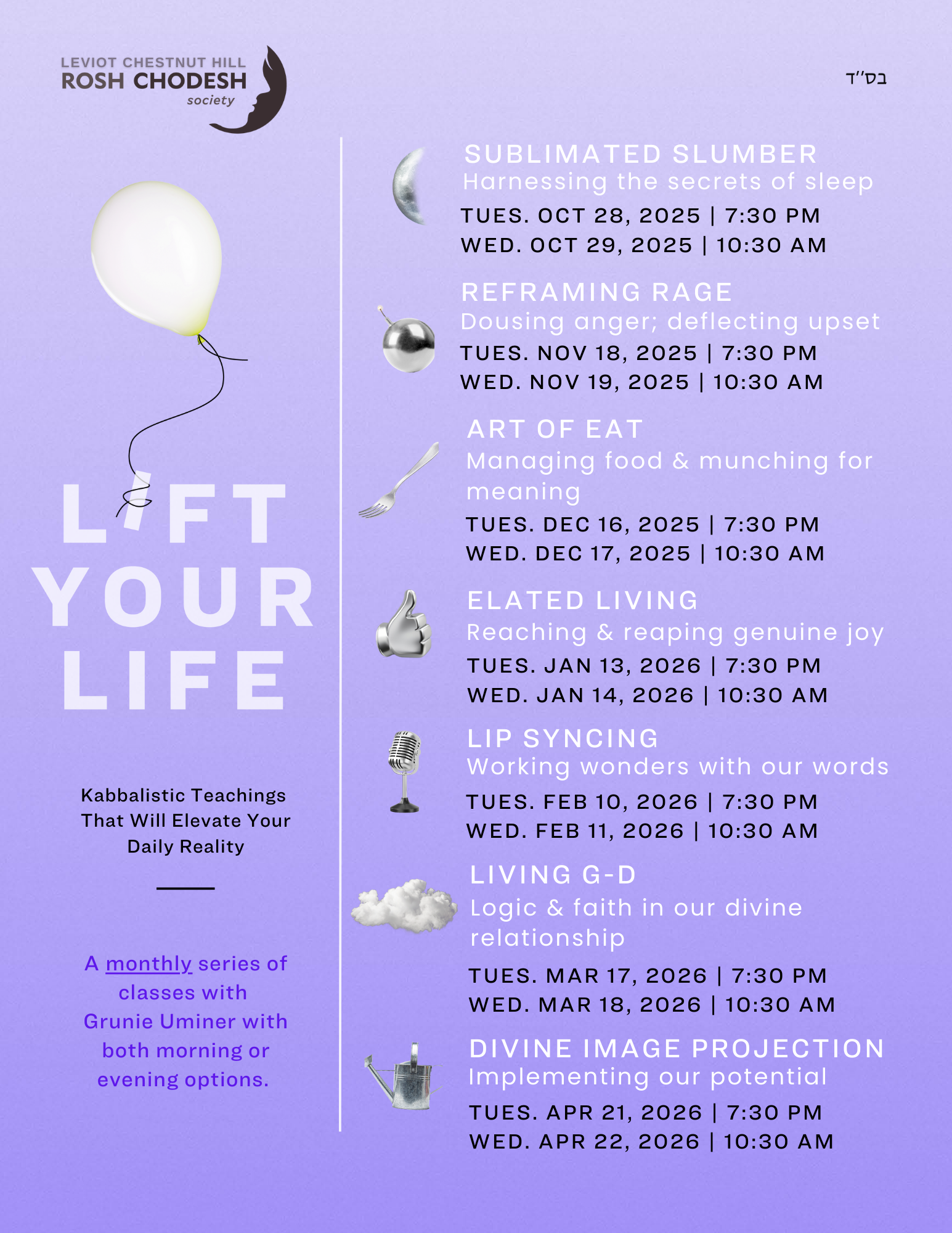LIFT YOUR LIFE
Kabbalistic Teachings that Will Elevate Your Daily Reality
Re-examine your basic activities and life features in the light of Jewish wisdom. It's time for an upgrade!
Our days are split into fragments of time, woven through our daily routine. It is in this a more than in the exceptional that we long to advance, because that is where improvement has the greatest impact on our lives.
The Rosh Chodesh Society is pleased to introduce a new seven-part course, Lift Your Life, which invites you to re-examine your basic activities and life features from sleep, emotional mastery, food, and happiness, to communication, faith, and personal growth. It offers profound perspectives along with doable tools of implementation all in the light of Jewish wisdom.
Join us on this journey which will gently guide you in upgrading and transforming your reality. It will Lift Your Life.
Lesson 1. Sublimated Slumber
Harnessing the Secrets of Sleep
PM Class: Tuesday, October 28, 2025 at 7:30pm - 10:00pm
AM Class: Wednesday, October 29, 2025 at 10:30am - 12:00pm
A fascinating exploration into the need for sleep, the actual shut-eye experience, and the keys to peaceful and effective slumber. Jewish wisdom for refreshing nights and inspiring days.
Lesson 2. Reframing Rage
Dousing Anger and Deflecting Upset
PM Class: Tuesday, November 18, 2025 at 7:30pm - 10:00pm
AM Class: Wednesday, November 19, 2025 at 10:30am - 12:00pm
Anger is damaging, rage is self-harm. Explore Jewish secrets for deflecting upset, tempering temper, and converting the most exasperating situations into goldmines of growth.
Lesson 3. Art of Eating
Managing Food and Munching for Meaning
PM Class: Tuesday, December 16, 2025 at 7:30pm - 10:00pm
AM Class: Wednesday, December 17, 2025 at 10:30am - 12:00pm
Meals can be ordeals, filled with anxiety and insecurity; healthy eating habits are hard to maintain. Discover satisfying Jewish wisdoms for managing the munch and sublimating lunch.
Lesson 4. Elated Living
Reaching and Reaping Genuine Joy
PM Class: Tuesday, January 13, 2026 at 7:30pm - 10:00pm
AM Class: Wednesday, January 14, 2026 at 10:30am - 12:00pm
Jobs, relationships, and health thrive in the sunlight of positivism, but lasting happiness is elusive. Jewish wisdom clarifies the way to cultivating a constantly smiling outlook.
Lesson 5. Lip Syncing
Working Wonder with Words
PM Class: Tuesday, February 10, 2026 at 7:30pm - 10:00pm
AM Class: Wednesday, February 11, 2026 at 10:30am - 12:00pm
Communication is key to relationships. Words can crush or cure. Discover Jewish methods of using words to reshape reality, reform relationships, unlock potential, and help people shine.
Lesson 6. Living G-d
Logic and Faith in Our Divine Relationship
PM Class: Tuesday, March 17, 2026 at 7:30pm - 10:00pm
AM Class: Wednesday, March 18, 2026 at 10:30am - 12:00pm
A rationalist studies her way to G-d; a believer feels her way. Judaism provides a beautiful blend of both. Discover a game-changing perspective on faith, a marriage of mind and emotion.
Lesson 7. Divine Image Projection
Freeing and Implementing Our Projection
PM Class: Tuesday, April 21, 2026 at 7:30pm - 10:00pm
AM Class: Wednesday, April 22, 2026 at 10:30am - 12:00pm
Positive intentions collide with reality. We leap mentally but remain rooted in reality. Jewish wisdom provides a doable strategy to glide uninterrupted from well-meaning to well done.







